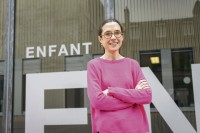Chronic & Non Communicable Diseases
Prevention & Personalised Health
Cancer
Diagnosis & Imaging
Biomarkers
Post-Doctoral Fellowships
Netherlands
2016.10.31
Fighting pancreatic cancer by developing a new approach for early diagnosis
Determining the role of force and mechanics on pancreatic cancer progression
To test his hypothesis and link mechanical properties of pancreatic cells to the progression level of a tumor, Dr. Coppola will experiment on human pancreatic cells grown in a laboratory, under the supervision of Prof. Thomas Schmidt. By introducing them with genetic alterations known to occur in pancreatic cancer, the team will be able to work on cells that behave the same way as their native cancerous counterparts. The experiments will consist of conducting mechanical measurements at different stages of cancer progression. More specifically, the researchers will apply stress on the cells in order to simulate what happens in the real pancreas and then measure their response. Simultaneously, the team will investigate the changes in the molecular behavior of the cells, thus aiming to understand the role of force and mechanics on cancer progression.
« So far, there are no effective therapies to reduce the mortality of pancreatic cancers », reports Dr. Stefano Coppola. Whereas significant improvements have been observed in the survival rate of numerous other cancers in recent years, mortality from pancreatic cancer remains unchanged.
By exploring new and innovative territory, Dr. Coppola’s objective is to uncover new fundamental knowledge about the progression of the disease. Not only could his findings lead to the development of a new diagnosis tool, his research could also contribute to the emergence of novel therapies involving new targets.

Stefano
COPPOLA
Institution
Leiden University
Country
Netherlands
Nationality
Italian
Related articles
Chronic & Non Communicable Diseases
Medical Treatment & Drug Development
Chronic Pain & Musculoskeletal Disorders
Drug Delivery
Biotech- and Nanotechnology
AXA Project
France
Pain Pediatric & Elderly AXA Research Lab (PEARL)
Chronic pain is recognized as a major public health problem affecting patients in their daily activity, physical and mental health,... Read more

Celine
GRECO
.thumbnail.jpg)
